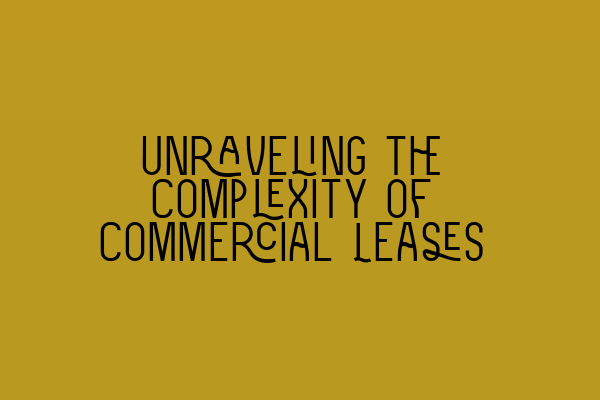Unraveling the Complexity of Commercial Leases
Are you considering leasing a commercial property for your business? It comes as no surprise that the world of commercial leases can be quite complex and filled with legal jargon. Understanding the ins and outs of commercial leases is crucial to protect your rights and ensure a smooth business operation. In this blog post, we will untangle the intricacies of commercial leases, making it easier for you to navigate through this process.
What is a Commercial Lease?
Before diving into the complexities, let’s start with the basics. A commercial lease is a legally binding agreement between a landlord and a tenant for the rental of a commercial property. Commercial properties can range from office spaces, retail stores, industrial warehouses, and more. Unlike residential lease agreements, commercial leases are often more complex and tailored to the specific needs of business tenants.
Important Elements of a Commercial Lease:
1. Lease Term: The lease term refers to the duration of the lease agreement. It is crucial to clearly define the start and end dates of the lease to avoid any confusion or disputes in the future.
2. Rent and Additional Costs: Commercial rents are typically specified either as a fixed amount or as a percentage of the tenant’s revenue. Make sure to understand how rent increases will be calculated over time and if there are any additional costs to be paid, such as property taxes, maintenance fees, or insurance.
3. Maintenance and Repairs: Commercial leases usually outline the responsibilities of both the landlord and tenant regarding the maintenance and repairs of the property. It is important to understand who will bear the costs and obligations associated with keeping the premises in good condition.
4. Use and Restrictions: Commercial leases often specify the permitted use of the property and any restrictions on how the premises can be used. It’s crucial to ensure that your business activities align with the lease terms to avoid potential conflicts down the road.
5. Termination and Renewal: Understanding the provisions for terminating the lease and any options for renewal is essential. You should be aware of the notice periods required and any penalties or consequences for early termination.
Legal Considerations for Commercial Leases:
1. Seek Professional Advice: Given the complex nature of commercial leases, it is highly recommended to seek professional advice from a qualified solicitor who specializes in property law. A knowledgeable solicitor will help you review the lease agreement, negotiate terms, and ensure your interests are protected.
2. Lease Review: A thorough review of the lease agreement is crucial before signing. Look out for hidden clauses, ambiguous language, or unfair terms that could negatively impact your business. Ensure that all verbal agreements are documented and incorporated into the written lease agreement.
3. Tenant Rights: Familiarize yourself with your rights as a commercial tenant. Understand your entitlements and protections regarding rent increases, lease renewals, subletting, and assignment of the lease.
4. Negotiation: Don’t be afraid to negotiate terms with your landlord. Lease agreements are often negotiable, and you can advocate for clauses that better suit your business needs. A skilled negotiator can help you achieve favorable conditions.
5. Legal Compliance: Ensure that the lease agreement is in compliance with all relevant laws and regulations. This includes zoning laws, health and safety regulations, and any specific regulations that apply to your industry.
Optimizing Your Commercial Lease Journey:
Now that we’ve covered the essentials, let’s discuss how you can optimize your commercial lease journey:
1. Consult an Experienced Solicitor: Partnering with an experienced solicitor specializing in property law will ensure that all legal aspects of your commercial lease are properly addressed. They will provide expert guidance and protect your interests throughout the lease process.
2. Thorough Due Diligence: Conduct thorough due diligence on the property you intend to lease. This includes examining its condition, location, accessibility, and potential for growth. Consider engaging professionals, such as surveyors or architects, to assess the property thoroughly.
3. Communication and Documentation: Maintain clear and open communication with your landlord throughout the leasing process. Ensure that all discussions, negotiations, and agreements are documented in writing for future reference.
4. Professional Lease Management: Once the lease is signed, it’s important to manage it professionally. Keep track of important dates such as rent payments, lease renewal options, and termination notices. Maintain regular communication with your landlord to address any concerns promptly.
5. Periodic Lease Review: Regularly review your lease agreement to assess its relevance to your business needs. This will help you identify any required amendments or opportunities for renegotiation.
Conclusion:
Navigating the complexities of commercial leases may seem daunting, but with the right knowledge and professional guidance, it can be a manageable process. By understanding the important elements, seeking legal advice, and optimizing your lease journey, you can secure a solid foundation for your business operations.
At SQE Property Law & Land Law, we specialize in commercial leases and provide expert advice and support to businesses. Our experienced team of solicitors will guide you through the complexities of commercial leases, ensuring a smooth and successful leasing experience. Contact us today to discuss your commercial lease needs and protect your business interests!
